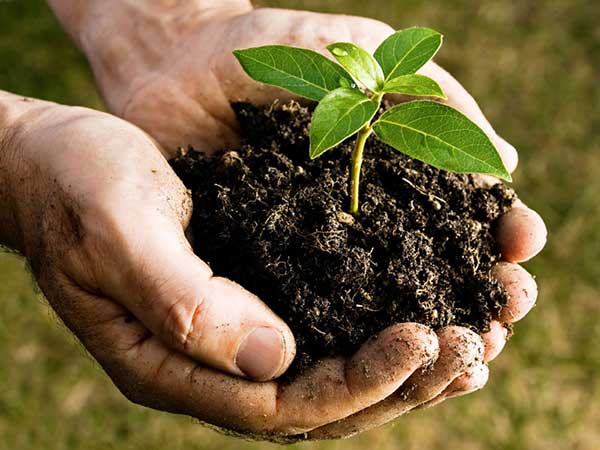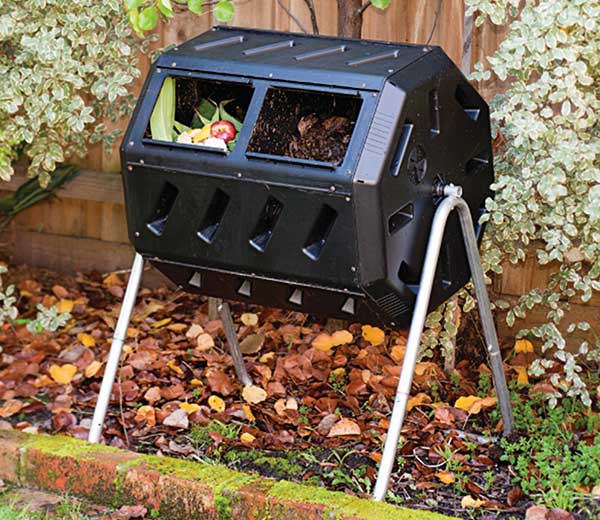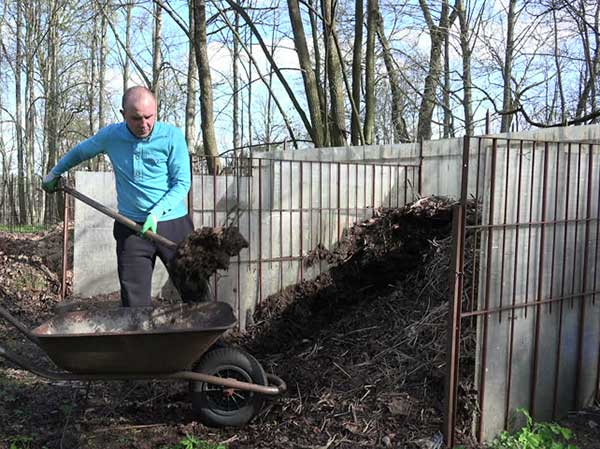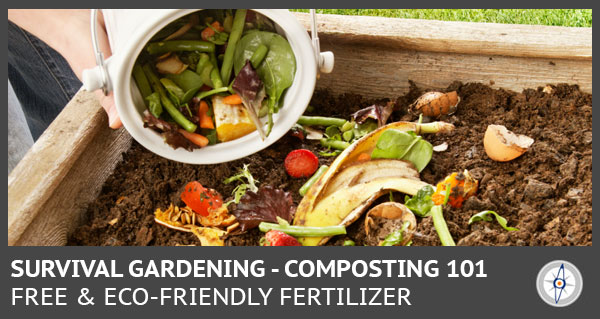SDN has moved!
Subscribe to our new @SurvivalDispatchNews Youtube channel
If you are looking for a more natural, chemical-free way to garden, you will need to start from the ground up—literally. The garden soil is going to determine whether you have a successful harvest from bountiful crops or if your plants suffer. Plants that are put into soil that isn’t full of nutrients are not going to thrive. This can lead to plant disease as well as invite pests who are all to willing to prey on weak plants. You don’t have to buy expensive chemical fertilizers and other soil additives to transform your barren soil into rich, healthy soil that can support plants. In a long term survival situation, chemical fertilizer might not be available even if you want it. You’ll have to go another route…composting.
Compost is the answer to your soil problems. Compost is organic matter that is worked into the soil. The best part about compost—it’s free!
What is Compost?
Compost is what you get after the decomposition process of things like fruits, veggies, leaves, paper and other organic material. With a little time, anything that is organic (coming from any living thing i.e. plants, animals, trees and so on) is going to decompose and turn into a dark, earthy substance. If you have ever seen compost at the nursery or hardware store, you know it resembles potting soil.

The compost is what is left once the decomposition process has been completed. The product left behind is going to be rich in nitrogen and carbon. When these additives are put into the soil, they improve the overall quality by inviting beneficial fungi and bacteria. These attract things like earthworms to the garden, which are extremely beneficial to the soil.
In a nutshell, compost, often lovingly referred to as black gold, is the good stuff that can mean the difference between a healthy, thriving garden and one that is struggling and full of problems. Compost is the base to any successful garden. Compost feeds the soil while fertilizer feeds the plants. You have to start with the bottom and work your way up in the garden.
Benefits of Compost
There are plenty of benefits to using compost in your garden soil. We have already mentioned your crops are going to be more prolific and your plants are going to be healthier. While those are certainly the two most important elements and the real goal behind the use of compost, there are a couple of other benefits that are worth mentioning as well.
Including…
- Helping the garden soil to retain moisture. This means you won’t have to water as much or as often. This is especially helpful to those plants that require a good, moist soil in order to thrive.
- Mixing compost into soil helps loosen it up, making it a more welcoming environment for plant roots. It can help transform sandy soil into healthy, fertile garden soil. Adding compost to heavy clay soils can help break it up and make it more inviting for plants.
- Composting is a great way to get rid of kitchen scraps and yard waste without filling up your garbage cans and ultimately—the landfills. Depending on your garbage disposal situation, you could potentially save money here. It is estimated kitchen and yard waste account for anywhere between 25 and 50 percent of what is tossed into the garbage.
- Compost that enriches the soil will result in better tasting produce. For instance, tomatoes have been proven to taste a little sweeter.
- You will find you need less compost each growing season. Once you have worked the soil with compost, it will be far more nutrient rich, inviting those healthy organisms. Your garden will get off to a great start with little work from you each spring.
- Compost is great for controlling soil erosion that can leave a raised garden bed far below what you started with.
- Adding compost into the soil boosts the ability of the plant roots to be able to absorb the nutrients in the soil. If you do choose to go with a fertilizer, the compost ensures it is more effective and the roots are able to properly absorb it.
What You Need to Get Started
If you are sold on the idea of creating your own compost, you will need a few things to get your composting off to a good start. You have a couple of different options here.
Buy
You can buy a composter. These are great if you live in the suburbs or have a small yard that could make it a little tough to have a compost heap. The plastic compost bins are generally large plastic orbs that seal up, keeping everything nice and tidy.

The bins also cut down the smell factor. They are typically on some kind of spinning device that allows you to turn your compost without doing anything more than turning a crank.
Compost Heap
You can do open compost heaps if you have some space and can put the heap away from your house and any neighbor’s homes. This is the traditional way. It does take a bit longer to break down than the enclosed plastic bins, which could be a drawback for some. Open heaps are often preferred if you plan on going big. This is also a great way to create three different heaps. This allows you to have one that is ready, one that is “cooking” and one that you add to. We will get more into the compost cycles in a bit.
If you plan on going with the open heaps, you can use pallets to make bins. One on bottom and then put up a couple of side walls to divide your heaps and a back wall. This makes it easy for you to add matter to your heap, turn it and remove the compost as needed.

Open heaps are best turned with a pitchfork. If you don’t have one, you will need to get one to make your life a little easier. A shovel isn’t ideal. The material will be heavy. You want a pitchfork that will essentially aerate your heap.
That’s it! You really need nothing else to get started making compost.
To be continued…
In the next post, we will dig into what you should and shouldn’t add to your compost heap as well as all of the dirty details of composting. Get your bins ready and then come back to find out what you need to do next.
Click here for Composting Part 2 – Composting Do’s and Don’ts
=====
Become a Survival Dispatch Insider …
We bring together survival enthusiasts and preppers to share skills and knowledge, so you can enhance your preparedness for emergencies and ensure the safety of you and your community.
The Results You’ll Get …
Our community, courses, and memberships are pretty special. We focus on the ways it will make a huge difference in your life.
Here are a few of the things you’ll be able to do as a member of Survival Dispatch Insider …
1) Improve your emergency preparedness by learning survival skills and strategies from experienced preppers.
2) Build lasting connections with like-minded individuals that share your passion for safety and readiness.
3) Access a wealth of knowledge and resources to assist in protecting you and your community during unexpected situations.
Click HERE to get started.
=====

